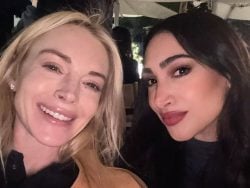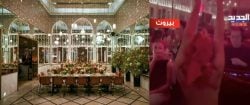Blog
Yasmine Hamdan: “Ya Nass” Is an Echo of the Arab Spring
Beirut official video clip – From “Ya Nass” album
Yasmine Hamdan’s recent album “Ya Nass” is the international release of her self named album that had a limited release in Lebanon and France in December 2012. Beirut.com delved into an exclusive interview with Yasmine to talk about her musical projects and discuss her spectacular approach to Arabic music.
Beirut.com: What’s the concept of “Ya Nass” and why did you choose to name your album after this song specifically?
Hamdan: “Ya Nass is a like an invitation for a discussion, a call to a single person or a crowd. A proposition. It could be an echo of the movements that are taking place in the Arab world.
I worked on the album with Marc Collin of Nouvelle Vague for two and a half months in his studio in Paris. We reworked the songs for this worldwide release and reshaped the album tracking. We also changed the album cover. Marc is very inspiring and intuitive. He trusted me and we worked in a very harmonious and free ambiance.”
Beirut.com: What makes “Ya Nass” different than your previous projects?
Hamdan: “I feel it’s my baby. I worked on the fine details of this album myself, and it was very pleasurable. I loved spending time in the studio trying things and searching for a sound. It is thrilling to be working on the relation ship between tradition and modernity.”
Beirut.com: What does it take to produce this kind of music that you experiment with?
Hamdan: “I consider myself very lucky to be doing the things I love. I am aware that it is a privilege. It’s also a day to day commitment, involving fear, pleasure, risks, and sacrifices etc… You learn a lot about yourself and your relationship to the world. You have to work a lot on yourself, and learn how to deal with your victories and also your deceptions. It’s an interesting playground. Composing music and performing. Collaborating is a very pleasurable and inspiring activity. It makes you live in a parallel world in which you have the possibility to create, and be challenged.
I search everywhere for inspiration. What’s important for me is to be free in a free zone.
“I love working on melodies. I love squeezing a song (when it’s a cover song for example) a structure, and a melody. I enjoy trying a song in different directions before finding my way out. When I compose, I start many times from the melody, and then search for the words that will suit my ears and fit my melody. Sometimes it takes me a week to find a word that I like. I always have my notebook, I write down the words that sound interesting to my ears. I can build a full song around a certain word, and then build the meanings on the song. It’s like a montage.”
Beirut.com: What are your standards for covering certain classic Arabic songs like “Ya Wardety Ya Nedyia” and “La Mouch Ana Elly Abky”?
Hamdan: “In fact it’s very interesting to work with the Arabic language, given its rich cultural background. For instance, when I sing in Egyptian, it’s very fluid and romantic and I become a different person; however the Lebanese dialect is heavier, round and has a different sensation than the Bedouin or Kuwaiti, which are very rhythmical. They sound different yet they all come from the same root. It’s a great luck to be able to pick what fits the compositions, the melodies, and the idea of the song. I enjoy playing with dialects because each dialect brings it s own back ground and connotations.
“I love old Arabic music. I listen to lots of old materials. So it’s natural for me to reinterpret a song that I feel I can appropriate and adapt it to my world. It’s very challenging and exciting. It brings colors to the album. I’ve always done that, since SoapKills.”
Beirut.com: Who influenced you from the Arabic singers?
Hamdan: “When I started discovering classic Arabic music, I listened to Mohamed Abdel Wahab, I obsessed on him. I used to listen to “Algondool” for like 40 times a day for nearly 6 months. Asmahan was another source of inspiration. Although her music is pretty old, it felt very edgy. And other artists of course like Zakiya Hamdan, Sheikh Imam, Sayyid Darwish, Fayrouz, and Omo Koulthoum.”
Beirut.com: And internationally?
Hamdan: “When I started, I discovered bands and artists with which i fell in love and from whom i was very inspired, like Portishead, Radiohead, Chet Baker, PJ Harvey, Neil Young, David Bowie, and Kate Bush, Pixies, Siouxies and the Banshees, and the Cure. I can also relate to the Indian or Asian music that I enjoy very much.”
Beirut.com: And how do you see your earlier collaborations with Zaid?
Hamdan: “SoapKills was my début. It was the beginning of my musical adventure. I actually didn’t know where it would lead me but I knew that my life changed for ever. It was a revealing experience. I received lots of criticism and got attacked by lots of conservatives because of it. But generally speaking, it was a thrilling experience after the end of the civil war. We suffered from lack of structure, means and recognition.
“Zeid introduced me to the Western music, of which I had little knowledge. And in a way I introduced him to Arabic music. It was a very rich collaboration, but also very tough because we were at the beginning of things. We come up with the band without planning it, I would say accidentally, and it was one the first underground bands singing in Arabic and proposing a deconstructed and contemporary sound.
“In reality, it wasn’t serious for me to sing in English, it was neither my language nor my roots. I became very involved and dedicated only when I started singing in Arabic, because I felt I had a project that wasn’t about me, but about a wider vision. It was thrilling creatively, intellectually and emotionally. Opening doors, proposing, searching and finding new ways of expressing Arabic in music. At that time, I knew what I didn’t want, but I didn’t know what I wanted. But after these years and collaborations with different artists, I know better where I want to go, even though I’m always searching and always getting lost!”
Beirut.com: When are you returning to perform in the Middle East?
Hamdan: “This fall hopefully.”
Beirut.com: What are your latest cinematic endeavors?
Hamdan: “I do many parallel projects with different artists in various fields. For example the song “Hal”, from my new album, was actually written for Jim Jarmusch latest film “Only Lovers Left Alive”, in which I have an appearance to perform my song. The movie is beautiful, I’m very thrilled by it. I am very proud and honored to be involved in this, as I’m a big fan of Jarmush’s movies. It’ll be released in December this year.
“I also did the music and the sound of the play “Rituel pour une metamorphose” directed by Sulayman Al-Bassam and performed at the Comédie-Française this spring/summer.”
Beirut.com: What are your plans for the near future?
Hamdan: “I’m going to be touring for my new album. In 6 or 7 months, I’ll start working on something new. Albums for me come naturally and spontaneously, rather than being a narrative.”
Beirut.com: What are your favorite spots in Beirut?
Hamdan: “Hamra and the Corniche. I used to go to Rawda café a lot when I was living in Lebanon.”
Beirut.com: Thank you very much Yasmine, for your time!





